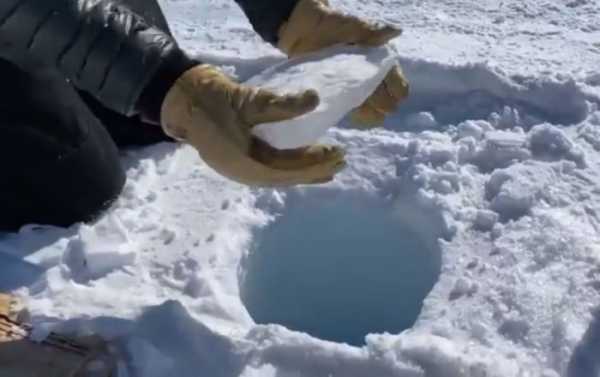
There are not many things that you can do in Antarctica, but ice is in abundance there. Literally trillions of tons of ice. What are you going to do with all of it? Throw it in deep holes. Super deep holes.
A viral video from Antarctica shows how ice can produce a fascinating mishmash of weird sounds with sci-fi overtones if dropped deep down a borehole.
Geologists actually drill those holes to release ancient air trapped in bubbles in ice deep underneath to see what Earth’s atmosphere used to be and how it has changed – something akin to counting tree rings. But once the work is done, it’s time to have some fun.
Isotope geochemist John Andrew Higgins has published a video of what happens when an ice chunk plummets down a hole drilled to a depth of about 140 metres.
The ice produces a clattering noise at first, followed by laser-like sounds straight out of a Star Wars movie, and several “heartbeats” toward the end of the fall.
This is not the first time Antarctic researchers have observed this effect; the idea was inspired by another popular video posted by another team of scientists about two years ago.
There has been some in-depth research on the subject suggesting that the pitch of the sound is changing due to the Doppler effect: the frequency of the sound wave increases and its length increases as the object recedes. The “laser” sounds and “heartbeats” are due to the sound waves bouncing off the sides of the borehole after the ice chunk hits the bottom.
Below is a bigger explanation from University of Rochester professor Mark Bocko:
“As the piece of ice falls down the hole, it scrapes and bounces off the edge of the borehole. You can hear the frequency of this sound decrease as the ice chunk picks up speed the further down the hole it gets. The decrease in frequency is the Doppler effect, the same effect that causes a car horn to drop in pitch as it drives past you.”
“After the ice chunk hits the bottom of the borehole, you can hear a “ricochet” noise, which is caused by the slightly different ways the sound from the impact propagates back up the borehole. The acoustic wave for the ‘heartbeat’ impulses travels straight up the borehole, while the other sound waves bounce back and forth off the side-walls of the borehole on their way up. This causes different frequencies to travel at different speeds. The high frequencies travel fastest and get to the top first while the low frequencies lag behind and arrive later.”
Sourse: sputniknews.com
0.00 (0%) 0 votes


































